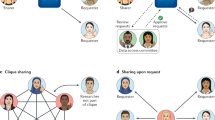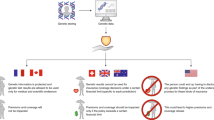Abstract
Concerns about human gene patents go beyond moral disquiet about creating a commodity from a part of the human body and also beyond legal questions about whether genes are unpatentable products of nature. New concerns are being raised about harm to public health and to research. In response to these concerns, various policy options, such as litigation, legislation, patent pools and compulsory licensing, are being explored to ensure that gene patents do not impede the practice of medicine and scientific progress.
This is a preview of subscription content, access via your institution
Access options
Subscribe to this journal
Receive 12 print issues and online access
$189.00 per year
only $15.75 per issue
Buy this article
- Purchase on Springer Link
- Instant access to full article PDF
Prices may be subject to local taxes which are calculated during checkout
Similar content being viewed by others
References
Doll, J. The patenting of DNA. Science 280, 689–690 (1998).
Cole-Turner, R. Religion and gene patenting. Science 270, 52 (1995).
Sturges, M. L. Who should hold property rights to the human genome? An application of the common heritage of humankind. Am. Univ. Intl Law Rev. 13, 219–261 (1997).
Diamond v. Chakrabarty, 447 US 303, 309 (1980).
Eisenberg, R. Re-examining the role of patents in appropriating the value of DNA sequences. Emory Law J. 49, 783–800 (2000).
Borger, J. Rush to patent genes stalls cures for disease. Guardian (Lond.) 1 (15 December 1999).
Butler, D. & Goodman, S. French researchers take a stand against cancer gene patent. Nature 413, 95–96 (2001).
Benowitz, S. French challenge to BRCA1 patent underlies European discontent. J. Natl Cancer Inst. 94, 80–81 (2002).
Gad, S. et al. Identification of a large rearrangement of the BRCA1 gene using colour bar code on combed DNA in an American breast/ovarian cancer family previously studied by direct sequencing. J. Med. Genet. 38, 388–392 (2001).
Merz, J. F. & Silverman, L. M. Uncovering rare mutations: an unforeseen complication of routine genotyping of APOE. Clin. Chem. 45, 1579–1581 (1999).
Merz, J. F., Kriss, A. G., Leonard, D. G. B. & Cho, M. K. Diagnostic testing fails the test: the pitfalls of patents are illustrated by the case of haemochromatosis. Nature 415, 577–579 (2002).
Krimsky, S. The profit of scientific discovery and its normative implications. Chicago–Kent Law Rev. 75, 15–39 (1999).
Anand, G. Big drug makers try to postpone custom regimens. Wall Street J. B1 (18 June 2001).
Marshall, E. Whose DNA is it anyway? Science 278, 564–567 (1997).
Caulfield, T., Gold, E. R. & Cho, M. K. Patenting human genetic material: refocusing the debate. Nature Rev. Genet. 1, 227–231 (2000).
Andrews, L. Future Perfect: Confronting Decisions About Genetics 127 (Columbia University Press, New York, 2001).
Heller, M. A. & Eisenberg, R. S. Can patents deter innovation? The anticommons in biomedical research. Science 280, 698–701 (1998).
Shapiro, C. in Innovation Policy and the Economy Vol. 1 (eds Jaffe, A., Lerner, J. & Stern, S.) 119–150 (MIT Press, Cambridge, Massachusetts, 2001). Available at http://www.haas.berkeley.edu/~shapiro/thicket.pdf
Merz, J., Kriss, A., Leonard, D. & Cho, J. Diagnostic testing fails the test. Nature 415, 577–579 (2002).
American College of Medical Genetics. Position Statement on Gene Patents and Accessibility of Gene Testing (2 August 1999). Available at http://www.faseb.org/genetics/acmg/pol-34.htm
College of American Pathologists. Gene Patents Detrimental to Care, Training, Research (5 July 2000). Available at http://www.cap.org/html/advocacy/issues/genetalk.html
Borsellino, M. World Medical Association tackling health database issue. Med. Post 36, 40 (2000).
O'Reilly v. Morse, 56 US (15 How.) 62 (1853).
Diamond v. Diehr, 450 US 175 (1981).
Bender, D. Patents Claiming Computerized Methods of Doing Business — Recent Developments. 670 PLI/Pat 7 (November 2001).
Portman, R. Legislative restriction on medical and surgical procedure patents removes impediment to medical progress. Univ. Baltimore Intellectual Property Law J. 4, 91–119 (1996).
Moore v. Regents of the University of California, 793 P. 2d 479 (1990).
Gitter, D. International conflicts over patenting human DNA sequences in the United States and the European Union: an argument for compulsory licensing and a fair-use exemption, NY Univ. Law Rev. 76, 1623–1691 (2001).
35 United States Code § 203.
42 United States Code § 7608.
European Parliament and of the Council of 6 July 1998. Directive 98/44/EC on the legal protection of biotechnological inventions [online], (cited 21/8/02) 〈http://europa.eu.int/smartapi/cgi/sga_doc?smartapi!celexapi!prod!CELEXnumdoc&lg=en&numdoc=31998L0044&model=guichett〉
Ex parte Scherer, 103 U. S. P. Q. 107, 110 (Board of Patent Appeals and Interferences, 1954).
35 United States Code § 287(c).
Schulman, S. Owning The Future 41 (Houghton Mifflin, New York, 1999).
Williams, M. The TRIPS and Public Health Debate: an Overview. Intl Gender Trade Netwk (August 2001). Available at 〈http://www.genderandtrade.net/WTO/TRIPS%20and%20Public%20Health.pdf〉
Cooper, H., Zimmerman, R. & McGinley, L. Patents pending: AIDS epidemic traps drug firms in a vice: treatment vs. profits. Wall Street J. A1 (2 March 2001).
Simmons, A. Suit against cheap AIDS drugs ends in South Africa. LA Times A1 (20 April 2001).
Parke-Davis v. H. K. Mulford, 196 F. 496 (2d circa 1912).
Genomic Research and Diagnostic Accessibility Act of 2002, H. R. 3967, 107th Congress, Second Session [online], (cited 21/8/02) 〈http://thomas.loc.gov/cgi-bin/query/z?c107:H.R.3967:〉
Author information
Authors and Affiliations
Related links
Related links
DATABASES
LocusLink
OMIM
FURTHER INFORMATION
American College of Medical Genetics
College of American Pathologists
Trade-Related Intellectual Property Rights
Rights and permissions
About this article
Cite this article
Andrews, L. Genes and patent policy: rethinking intellectual property rights. Nat Rev Genet 3, 803–808 (2002). https://doi.org/10.1038/nrg909
Issue Date:
DOI: https://doi.org/10.1038/nrg909
This article is cited by
-
It’s About Scientific Secrecy, Dummy: A Better Equilibrium Among Genomics Patenting, Scientific Research and Health Care
Science and Engineering Ethics (2012)
-
DNA patents and diagnostics: not a pretty picture
Nature Biotechnology (2010)
-
Changing the rules of the game: addressing the conflict between free access to scientific discovery and intellectual property rights
Nature Biotechnology (2010)
-
Eugenics, the Genome, and Human Rights
Medicine Studies (2009)
-
Antibody patenting without antibodies: a global trend
Nature Biotechnology (2008)



